Previous Fellows
Each year, the Kaplan Institute’s Public Humanities Graduate Practicum supports a cohort of fellows as they develop a public humanities project of their own design. Below is a list of our previous fellows and their projects.
2024-2025 FELLOWS
 Daniel Atwood (Musicology)
Daniel Atwood (Musicology)
Licks from the Loop: Highlighting Chicago’s Street Musicians
This project, Licks from the Loop, is a series of short videos highlighting street musicians who perform in downtown Chicago and the improvisational strategies they use while making music. Each episode features a different performer sharing a bit about their background and musical style, then demonstrating one or two of their favorite licks or musical techniques. The videos include on-screen sheet music notation and guitar tablature of the music, offering viewers a chance to learn improvisational techniques from the musician; the videos also include download links to accompanying learning materials based on the musical ideas in each video. Blending performance, music education, and storytelling, this series highlights the musical artists who contribute to downtown Chicago's unique soundscape and cultural fabric.
 Austin Bryan (Anthropology)
Austin Bryan (Anthropology)
“Stigmatized as ‘Promoting’ with the ‘Duty to Report’”: A Zine
This project is a zine that visualizes research on the stigmas faced by Ugandan public healthcare workers under the country’s 2023 Anti-Homosexuality Act, which mandates the reporting of LGBTQ+ individuals to the police. The zine explores the ethical dilemmas, key challenges, and coping strategies involved in providing care to HIV key populations in this legal context. Topics include socio-legal stigma, stigma by association, navigating ethical obligations, and building resilience through advocacy. Through visual storytelling, the zine functions as an accessible resource for healthcare professionals and the broader public, fostering awareness of rights and promoting LGBTQ+-affirming care. The project ultimately aims to spark broader conversations and support within the healthcare and development sectors.
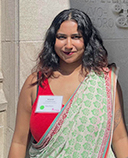 Srishti Chatterjee (Rhetoric, Media, and Publics)
Srishti Chatterjee (Rhetoric, Media, and Publics)
Mapping Journeys: Visualizing Community Relationships to Place and Journey
In this project, Srish interviews people who have moved, in pursuit of education, work, safety, and community, embedding their stories in the maps of journeys that form their lives. Additionally, Srish is designing and delivering workshops in the Chicagoland area about participatory mapmaking, i.e, projecting people's narrative histories onto the various maps that make up their lives. Srish has delivered some of these workshops in Senior Living Centres, and is presenting a future one at the Evanston Public Library.
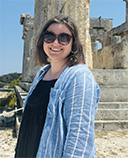 Sophia Elzie (Comparative Literary Studies)
Sophia Elzie (Comparative Literary Studies)
Antigone in Chicago
The Antigone in Chicago project uses the city’s most popular Greek tragedy as a starting point for conversations about translation, the creative challenges and joys of staging ancient tragedy, and the role theater plays in our current moment. As part of this project, I gave a talk to 30 high school students at the Illinois Junior Classical League called “Choose Your Own Antigone.” I gave students an overview of the play and its performance history in Chicago before briefing them on the basics of translation theory. We then read or watched the same scene from four different translations. Using these examples, students were able to articulate their preferences and left with a greater awareness of translation as an interpretive act.
In the last year, three separate productions of Antigone were staged at the Court Theater, Northwestern University, and the Athenaeum Center for Thought and Culture. On April 24, I will moderate a panel bringing together members of the creative teams from each of these productions to share parts of their decision-making processes. In the weeks leading up to the panel, I hosted Antigone reading groups at public libraries in Ravenswood and Edgewater. These events provide space to bring together people who are theater professionals or who are interested in theater to gather in community and create connections through their shared interests. Through this project, I have also recirculated 20+ copies of tragedies to high school students and community members.
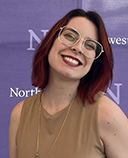 Bridgette Hulse (Anthropology)
Bridgette Hulse (Anthropology)
Indiana Jones and the True World of Archaeology
Indiana Jones is the most prominent archaeologist in the public consciousness. His fantastical exploits and world travels are many people's first introduction to archaeology, fostering a public fascination with the field. In my YouTube video essay, “Indiana Jones and the True World of Archaeology,” I utilize the public’s love of Indiana Jones to introduce people to the real field of archaeology, discussing its faults, its successes, and the current state of the field. I discuss the archaeological theories of Indiana’s time, their intellectual history, and the ethical implications of Indie's work. As such, I use Indiana Jones as a vehicle to demystify the real academic work happening in the field. To this end, I aim to expose people to current archaeological theories and methods as the fanciful archaeology portrayed by Indiana Jones feeds into real-world misinformation and pseudo-archaeological narratives.
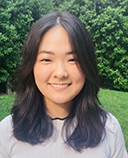 Dami Kim (History)
Dami Kim (History)
A Rememory of Harriet Hayden's Parlor
Building on her undergraduate honors thesis "A Rememory of Harriet Hayden," Dami created a StoryMap of Harriet’s parlor at 66 Phillips Street in Beacon Hill, Boston. Having escaped to freedom from slavery in Kentucky, Harriet ran an Underground Railroad boarding house that provided refuge to fugitives. Her parlor acted as a space of resistance, community, and respectability for herself and her family, as well as for many Black individuals who passed through. The parlor displayed photograph albums of abolitionist friends and allies, pikes from the Harpers Ferry raid, Governor Ames’s quill, Victor Hugo’s artwork, and more. This digital exhibition serves as a visual and accessible memorial to Harriet Hayden.
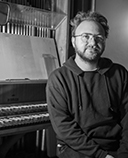 Jack Langdon (Composition and Music Technology)
Jack Langdon (Composition and Music Technology)
Improvised Music for Pipe Organ
In the concert series Improvised Music for Pipe Organ, I invite a variety of musical improvisers to perform alongside myself on the pipe organ. Each event takes place in three parts and lasts a total of ninety minutes: an opening musical performance with myself and my collaborator, a discussion with the collaborator about improvisation and their relationship to religious culture and spirituality, and an open improvisation which invites anyone from the audience to join in a collective performance. We are holding concerts in various churches throughout Chicago—allowing musicians, community members, and improvised music fans to experience the sound of the pipe organ outside of Christian religious ritual. As a member of the improvised music community in Chicago since 2017, I am inviting musicians whose musical culture creates new spaces of engagement and creativity within religious spaces which house pipe organs. Through these performances, the series will demonstrate that the pipe organ can be expanded beyond its foreboding stereotypes as a musical instrument—allowing a much more capacious identity to emerge through improvised performance, community discussion, and public advocacy.
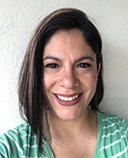 Mariel Melendez Mulero (Theatre and Drama)
Mariel Melendez Mulero (Theatre and Drama)
Mapping the Cartographies of the BalletRican Imaginary
Through oral history, ethnography, and archival work, this project documents Puerto Rican ballet dancers’ histories into a series of digital maps to trace their trajectories across a transnational cartography. It engages the interdisciplinarity of theater and dance history, anthropology, the body, its corporealities, Caribbeanness and the Latinx experience. The following questions guide inquires: What is the relationship that exists between the island’s modern and contemporary history and the development of ballet as a discipline? What elements of the Puerto Rican diasporic and transnational experience inform ballet as a national and embodied aesthetic? By tracing individual dancers’ experiences, this mapping project visualizes the choreographies of the BalletRican imaginary. It furthers understanding on the role of ballet within the canon of Puerto Rican dance and corporeality, as well as its present-day importance in building community, memory, and belonging across the Rican transnational experience.
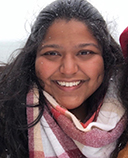 Achi Mishra (Technology and Social Behaviors)
Achi Mishra (Technology and Social Behaviors)
Reimagined AI
Reimagined AI’s mission is to provide a creative space for speculative fiction centered around ethical issues within AI systems. Through a seven-part workshop series in partnership with San Diego Writers, Ink., creative writers learn about the harms of AI. Each workshop has a different theme and consists of three AI case studies, a free-writing session, and a discussion devoid of writing critique. Ultimately, the goal of this project is to amplify the voices of creative writers and see the AI future through their eyes. This interdisciplinary approach sheds light on key issues and nuances that might be missed by those developing AI technologies with a siloed approach. Workshop materials and writers’ stories can be found on the project website: www.reimaginedai.org. While the call for online stories is ongoing, a published anthology of select works will be available in the summer.
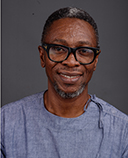 Uche Okpa-Iroha (Art History)
Uche Okpa-Iroha (Art History)
Danfo Dialogues: Shifts in Nigeria’s Contemporary Photography Landscape
This project aims to amplify the voices of emerging contemporary Nigerian photographers. These photographers have taken center stage to redefine global perceptions of African art by merging local narratives with universal themes, challenging stereotypes through innovative visual storytelling. Their work interrogates Nigeria’s rapid urbanization, the fluidity of postcolonial identities, and the country’s evolving role in global cultural dialogues. The project amplifies these voices through a multifaceted approach: a curated exhibition showcases striking imagery of urban transformation and grassroots activism; an artist-talk session in Chicago to foster cross-cultural exchange; website to contextualize the photographers’ work within Nigeria’s socio-political fabric; and a video presentation to trace their creative journeys. By bridging Nigerian visual culture with international audiences, the project sparks critical conversations about place, cultural identity, and the power of photography to reshape narratives. The project positions Nigeria as both a hub of creativity and a vital contributor to contemporary global art discourse, underscoring photography’s capacity to transcend borders and redefine cultural identity.
 Sofia Sanchez (Spanish and Portuguese)
Sofia Sanchez (Spanish and Portuguese)
Stages of Redemption: A Manual for Restorative Practices through Theater
This project aims to publish a manual featuring writing and body exploration exercises rooted in theatrical principles, which have proven effective in working with young people in juvenile detention facilities in Medellín, Colombia. This initiative is a collaboration with La Parla, an organization dedicated to facilitating creative processes as part of broader Restorative Justice efforts. The manual will include five carefully designed exercises and reflections on the role of the arts in peacebuilding, highlighting how creative expression can foster dialogue, resilience, and new possibilities for reconciliation. These activities encourage personal exploration and collective reflection within communities affected by traumatic experiences. By sharing methodologies developed in a local artistic context, this project seeks to provide valuable tools for educators, social workers, therapists, and others interested in working with young people in transformative and healing ways.
2023-2024 FELLOWS
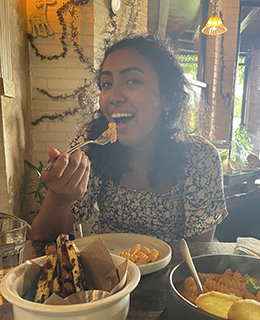
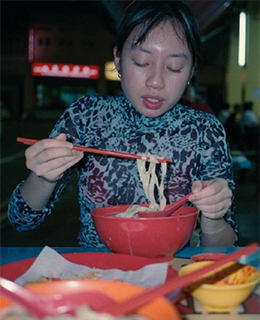 Archita Arun • Performance Studies
Archita Arun • Performance Studies
Clara Lee • Performance Studies
Craving Together: A Digital Archive of What We Eat
Craving Together explores diasporic, immigrant, and refugee food cultures and cooking as community care practices. The project involves creating an online recipe index that compiles recipes sourced from the diasporic, immigrant, and refugee communities in Chicago. The index serves as an ongoing archive that documents the stories of the individuals who are brought together by these recipes and the foods that they crave.
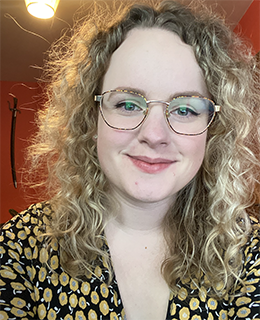 Lauren Cole • History
Lauren Cole • History
Gender and Medieval Studies: A YouTube Series
This project investigates effective ways to communicate research in medieval studies to audiences of young adults on the video-sharing platform YouTube. Experimenting with a variety of different formats, including YouTube shorts, day-in-the-life style videos, and longer-form content, this project encourages viewers to critically examine their assumptions about medieval Europe, and how these assumptions underpin oppressive structures in the present moment. The project particularly foregrounds gender, offering a series of videos on medieval women mystics.
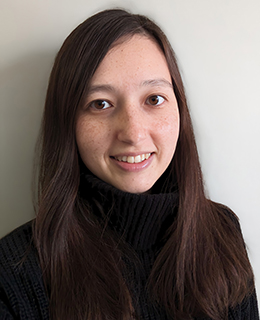 Jennifer Comerford • English
Jennifer Comerford • English
The Experiential History Project
Amid expanding global trade networks and burgeoning national cuisine, eighteenth-century British makers were beginning to confront many of the questions increasingly occupying us now. Through short-form videos on Instagram (@experientialhistoryproject), this project recreates some of the recipes found in these eighteenth-century texts as a method of not only gaining insight into the embodied knowledge that exceeds textual representation, but also as way of demonstrating how these practices can inform our present concerns around food culture, labor, sourcing, and appropriation. Featuring recipes for everything from Jane Austen’s iron gall ink to the first known recipe printed in English for curry, this series reveals how recipe books are critically productive sites for interrogating present preoccupations because of the way they push and pull us between the strikingly familiar and persistently estranging.
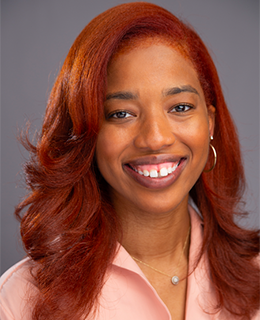 Peri Green • Learning Sciences
Peri Green • Learning Sciences
Community Crawls TikTok Series
Community Crawls TikTok Series is an event where a group of people visit multiple community places in a single day, typically with the intent of learning more about what’s available to them in their neighborhoods. Over three weekends, young people from the South Side of Chicago participate in Community Crawls, visiting and exploring museums, parks, and libraries across the South Side. The project aims to showcase the accessible community assets available to youth, emphasizing how they can utilize these spaces during out-of-school time. The experiences gathered during these crawls have been shared through a TikTok series, providing a fresh depiction of potential activities and learning environments in the South Side through the eyes of youth themselves.
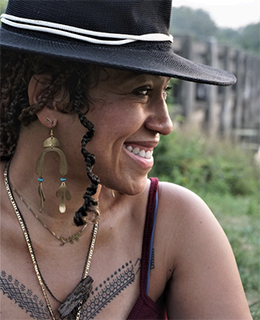 Jennifer Ligaya • Performance Studies
Jennifer Ligaya • Performance Studies
Life in Blasia: A Podcast
This project is a podcast that aims to explore and amplify voices within the "Blasian" community, addressing the historical intersections of Black and Asian identities in America by delving into the lived experiences of individuals with one Black and one Asian parent. Through these narratives, the podcast seeks to provide a platform for critical dialogue, exploring the impact of American imperialism, militarism, and racialized labor on the formation of identities and fostering understanding and recognition of the unique contributions of the mixed Black and Asian heritage.
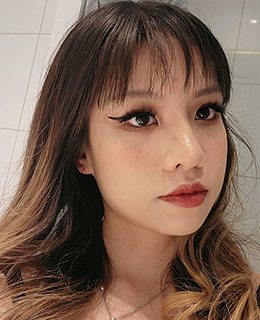 Victoria Pham • History
Victoria Pham • History
Mapping Connections: A Vietnamese American Webinar Series
Utilizing a relational approach, this webinar series highlights the convergences of Vietnamese resettlement with other communities of color, demonstrating the intimacy of these connections that cannot be written off as coincidental. In this series, participants are encouraged to build consciousness of U.S. racial formation and reflect on their identity in tandem with intersecting factors of gender, class, sexuality, and etc. The historical focus in these webinars allows participants to acquire meaningful knowledge that helps contextualize how contemporary circumstances, narratives, and politics of the Vietnamese diaspora came to be. Open to all ages, this webinar series encourages intergenerational conversations and connections.
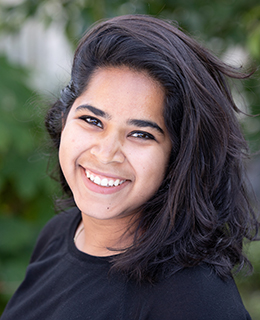 Devika Ranjan • Performance Studies
Devika Ranjan • Performance Studies
THIS IS NOT A MEMORIAL: a performance, an act of community care
THIS IS NOT A MEMORIAL is inspired by mutual aid work in the city of Chicago, contact improvisation, and my performance practice as a deviser and facilitator around urgent societal questions. How can we be bodies for other bodies, for each other? How can we know ourselves as an integral part of a collective? In creative collaboration, we (the audience, myself, our community) experiment with what it means to enact attention as care, and how we can be an embodied collective during moments of precarity and crisis. Within the performance, we move in our bodies, co-imagine new modes of community, and create 100 hygiene kits for migrants in an act of mutual care.
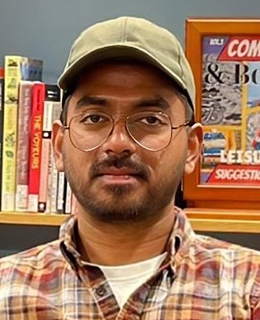 Bipin Sebastian • Rhetoric, Media, and Publics
Bipin Sebastian • Rhetoric, Media, and Publics
Minorities and Majorities
This podcast project will engage with the diverse histories and politics of modern nation states, and multi-nation states, with a focus on majorities and minorities. The contemporary rise of ethno-religious majoritarianism around the world has made the majority-minority question fraught again, especially for the modern multicultural democracies. In this populist context, minoritized identity is the result of the majority group’s attempts to appropriate the state for itself, rather than a self-conscious formation by those marked as minorities. Based mostly on their religious, ethnic, or linguistic identities, minorities in modern history have been met with varying degrees of pluralism, assimilation, ghettoization, exile, population transfer, and even extermination. This project examines the varied histories and futures of the majority-minority question in conversation with experts addressing contexts globally.
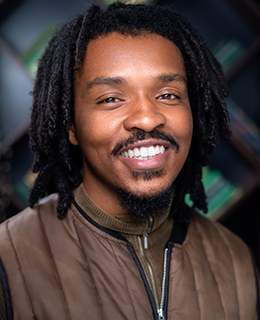 Craig Stevens • Anthropology
Craig Stevens • Anthropology
AfriSem: 3D Humanities Speaker and Workshop Series
The AfriSem 3D Humanities Speaker and Workshop Series aims to bring together Northwestern University’s African Studies, Technology, and Public Humanities communities through inspiring presentations and hands-on workshops regarding the future of African heritage and digital media. This month-long series is designed to provoke conversations and experiences that engage the legacies of shared culture and objects, the future of museums, and the potentials enabled through emerging digitization technologies.
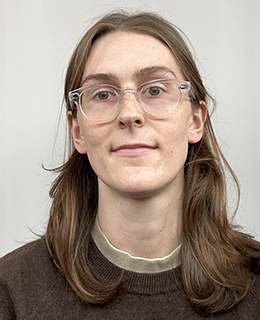 Kylie Walters • Radio/Television/Film
Kylie Walters • Radio/Television/Film
Psychoanalysis and the Climate Crisis
As “an art of listening to what remains shrouded but insistent,” what can psychoanalytic theory offer us in thinking about climate change? This public humanities seminar will gather a small group of Chicagoans over readings at the intersection of psychoanalysis and climate change from late winter through spring. It aims both to provisionally orient participants to psychoanalytic theory and to ask how psychoanalysis might expand and sharpen the formation of climate politics. The project seeks to provide participants with a social space in which to discuss a pressing but widely and diversely disavowed issue and to offer, through community, rigorous thought.
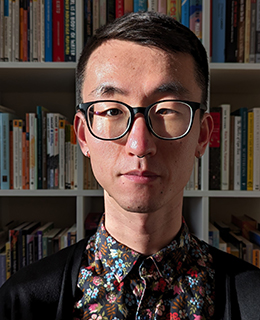 Yuan-Chih (Sreddy) Yen • English
Yuan-Chih (Sreddy) Yen • English
Race from Africa: Four Literary Commentaries
In this series of four Instagram Lives, we will hear from African writers working in various genres on how they engage and negotiate race and racialisation in their work. Given these Afropolitan (as some might say) writers’ situation across both the African continent and the diaspora, and given the many academic theorisations of race (most often from the U.S.), this project aims to foreground what “blackness” means to these literary voices who have spent a formative portion of their lives on the continent and/or whose literary practices are critically grounded in Africa. By opening up the Live to questions from the audience, this project also hopes to make space for conversations in the African and diasporic #Bookstagram communities about what solidarity-building might look like.
2022-2023 Participants
Rebekah Bryer • Theatre and Drama
Remembrance and Reckonings
This limited podcast series looks at the public reckoning and debates over commemoration in the United States in the summer of 2020, ignited by the murder of George Floyd. Over six episodes, the podcast examines how the debate over public commemoration reached a tipping point in 2020, follows what happened to a few of the monuments that came down over that summer, and questions what, if anything, has changed in the landscape of public commemoration in the United States.
Kyle Craig • Anthropology
Stories of the Palestinian Intifada — Through Comics
In collaboration with Palestinian political cartoonist and illustrator Nidal El Khairy, this graphic storytelling project will share accounts of how Palestinians experienced, endured, and resisted during the First Intifada (1987-1993). Their stories are drawn from a collection of oral history interviews in which a diverse group of Palestinians share memories of these mass uprisings against Israel’s military occupation of the Gaza Strip, West Bank, and East Jerusalem. We are currently drafting the first chapter of this comics series, exploring Nidal’s childhood memories of visiting his family in the Palestinian city of Ramallah during the First Intifada. We hope this project will strengthen cross-border solidarities that recognize the connection of the Palestinian struggle with all mobilizations for more justice-oriented worlds.
Bailey Flynn • Communication Studies
Climate Resilience and Community Technologies, a Workshop Series
Climate resiliency—our capacity to prevent, withstand, and recover from destructive effects of climate change—is becoming an increasingly important concept as we approach 1.5° of global warming. This project seeks to equip Northwestern and Chicagoland attendees with mutual aid tools to bring to their community’s climate resilience toolkit. Participants will gather for a three-part online workshop series featuring hands-on activities that can help shape not only resiliency under climate crisis, but equity and liberation. Experts in the field of climate justice, including Shareable, People Power Solar Co-Op, and People for Community Recovery, will guide participants through battery sharing programs, building a community "library of things," and more. Our goal is to connect environmental justice communities to valuable community-building tools that can complement more common analog projects, such as food sustainability and rewilding efforts.
Olabanke Oyinkansola Goriola • Performance Studies
Telling Our Dance Stories and Reclaiming Our Voice: The Chicago Black Dance Legacy Project (CBDLP) Through a Black Metropolis Graduate Assistant (BMGA) Perspective
With the structural inequality in arts philanthropy, which majorly affects Black dance companies, and the critical issues facing the field of Black dance, the project titled Redefining Legacy: The Chicago Black Dance Legacy Project and the Newberry aims to ensure Black heritage survival and continuation by partnering with Black Dance companies to strengthen their financial and operational capacity. The project is a local and national model for collaborative strategies to strengthen the Black dance field as a whole, safeguard their rich artistic legacies to avoid erasure, and provide free and open access to historical documents of research value through the Newberry Library. With the misinterpretation and documentation of Black dance stories over the years that do not do justice to the cultural, spiritual, and historical richness of Black history, CBDLP bridges the gap and creates a platform where the Black communitarian spirit can be channeled towards reclamation, documentation and preservation of Black dance legacies in Chicago and beyond.
Prince Grace • Sociology
Racial Futures Present: Cultivating Critical-Race and Critical-Futurist Literacies through Digital Tools
Ideas of race continue to inform worldbuilding in speculative and experimental spaces, from imaginings of “alien races” to planning the future of the “human race.” This digital exhibit highlights emergent forms of race-making across space commerce and governance, astronomy, and speculative fiction, encouraging users to explore how present-day imaginings organize future social orders and set the stage for inequalities to come. The project interlinks key texts and ideas from critical race and critical futures studies with records from influential sites of worldbuilding, mapping connections between artifacts such as astrobiological equations, Star Trek, and the project and governing frameworks of SpaceX and international space law.
Stephanie Jones • Computer Science and Learning Sciences
Adopting a Graphic Media Format for Publications
I and a colleague, Natalie Melo, published a paper entitled “We tell these stories to survive: Towards abolition in computer science education.” In this paper we use speculative fiction to illuminate stories of a young Black femme, Shanel, who was pursuing computer science education. Through the Public Humanities Project we plan to turn this academic style paper into a comic, graphic novel, or zine aimed at educating teachers and young people about tensions within CS education and possibilities that take us outside of this. I see a major issue with scholarship staying only in academic circles, and see this as an opportunity to create materials that invite dialogue with the communities I am a part of and serve.
Em Kamm • History
Interactive Seed Stories in Chicago and Beyond
Seeds carry genetic information to grow a new plant. They also carry stories, memories, and cultural legacy that connects past to present to future. This project will invite Chicago seedkeepers, cultural workers, and gardeners or growers to share stories of a seed with which they are in relationship. The collected stories and their presentation will emphasize networks of migration and the long history of how people have made seeds and plants part of such journeys. Phase one of the project will produce a zine for the start of the 2023 growing season in May. Future phases will develop interactive digital essays, to explore specific plant relationships in more depth.
Emily Masincup • Musicology
Learning from Fear and Fantasy: A Mexican Horror Film Event
I plan to host a film screening of a recent Mexican horror film and talkback session in the Chicagoland area which prioritizes accessibility concerns for members of Latine communities here at Northwestern and Evanston. I plan to make admission for the event free, to include linguistic accommodations for both English and Spanish speakers, and to host the screening in an area that is easily accessible for the target audience. Following the screening, I hope to facilitate a bilingual talkback session with one or two guest speakers after the film. This session should allow native Spanish and English speakers alike to participate in a dialogue about how the film addresses contemporary fears and anxieties experienced amongst Latine populations in both Latin America and the United States.
Ishan Mehandru • Comparative Literary Studies
Souyma Rachel Shailendra • Comparative Literary Studies
Translators’ Adda: Translating Caste and Sexuality from South Asia
Imagining translation workshops outside the confines of the university classroom, the Translators’ Adda seeks to acknowledge, hone, and foster quotidian translational practices amongst multilingual South Asian communities in the Chicagoland region. Spanning over the course of the winter and spring quarter, we will host two masterclasses where the participants will workshop their own translations of pre-circulated texts in Hindi-Urdu and/or other South Asian languages. Each session will be moderated by a published translator who will guide us in navigating asymmetrical cultural contexts while focusing on two major themes — “Translating Caste” and “Translating Sex.” Our workshops will encourage dialogue around the sociopolitical climates and literary influences of Dalit and queer cultural production.
Cinnamon Williams • African American Studies
The Catrina Project for Survivors of Domestic Violence
The Catrina Project is a feminist, public effort to connect Black women and non-binary survivors of intimate partner violence. In weekly virtual meetings, participants read Black feminist writings about the topic, share their experiences with each other to connect/build community, and produce reflective writings about the impact of intimate partner violence on them.
Olivia Lingyi Xu • English
Brokering the English Novel in Non-(Native) English-Speaking Communities
This public syllabus is intended for a non-(native) English-speaking local community that has an interest in exploring the English novel but may not feel entirely comfortable reading and talking about it in English. We will rely extensively on excerpts, translations, adaptations, and pop-culture reinventions of the chosen texts. This project will also be developed in collaboration with several secondary school English teachers in Guangdong, China, where this preliminary syllabus will be tested out in a local classroom setting and potentially incorporated into school curriculum.
2021-2022 Participants & Projects
Emiliano Aguilar • History
Teaching the Calumet Region: A Public Syllabus Project
This project seeks to develop a public history syllabus for grades 6-12 and college educators teaching the history and culture of the Calumet Region of Illinois. The project hopes to balance a variety of information with resources and scholarship that is both engaging and accessible for various classrooms and student communities.
Daniela Raillard Arias • Anthropology
Narratives of Andean Archaeology Through Online Platforms
Daniela will organize a photo-story contest through her project social media @MAPAchachapoya to engage local Peruvian community members in co-creating narratives of Chachapoya archaeology and heritage, and compensating local artisans for prizes. She is also creating short video content to educate English-speaking publics on the diverse histories of the pre-colonial Andes and respectful travel to South American archaeological sites (@andes_archaeology on TikTok).
Marissa Croft • Rhetoric and Public Culture
Stitches in Time: Sewing Like a Turn-of-the-Century Chicagoan
Recent interest in the history of fashion and our historical relationship to clothing presents an opportune moment to introduce the public to introductory sewing techniques and the basics of garment construction through the lens of local history. This workshop is designed to teach participants how to responsibly study and make clothes using a pattern-drafting system developed in Chicago in the 1890s. Participants will select a recycled textile to work with, and then assemble a garment using a sewing machine, all while learning about the history of fashion and garment manufacturing in Chicago around the time of the World’s Fair of 1893. Participants will come away with a simple self-made wearable garment, general sewing machine basics they can apply to their own wardrobes, and knowledge about the history of fashion in Chicago at the turn of the century.
Deisi Cuate • Spanish and Portuguese
Mexican Voices in New York City: A Community and Networking Event
This community event will celebrate the lived experiences of Mexican and Mexican Americans in New York City, a population that has grown tremendously in the last three decades but continues to be underrepresented in NYC creative worlds, government, higher education, and other areas. This event will bring awareness and visibility to these narratives orally and materially via spoken word, poetry, music, artwork, and photography so that scholars and community members may engage with each other.
Holly Dayton • History
Making History: A Podcast About How Historians Do Their Job, and How They Can Disagree
This podcast series asks the hard but obvious question — How do we write history? — and tries to answer it. Through interviews and narration, Holly explores how historians find sources, how they analyze them, and why two people looking at the same chart may draw very different conclusions. Part pedagogy, part nerdy romp, Holly hopes to engage people in the field and their generally-uninterested network of friends and family.
Alexandra De Leon • History
Long Journey Home: Reconciliation and The Return of War Trophies from the Pacific
This exhibit explains the history and emotional journey of WWII souvenirs as they traveled from the Pacific, to the United States, and then back to the families of Japanese soldiers in Japan. Many of these objects were Japanese flags, signed by the soldier's family and friends before they departed to the front — precious reminders of home that they carried on their bodies as protective charms. The exhibit collaborates with Obon Society, a non-profit organization dedicated to reuniting these objects with families in Japan. The exhibit will be paired with a public discussion of war memory and the potential for reconciliation between families of former enemy nations.
Alexandra Gonzalez • Rhetoric and Public Culture
Black Evanston: An Interactive Oral History
This digital storytelling project builds on oral histories collected by Northwestern students and Shorefront Legacy Center. The project will combine digital tools, photographs, and excerpts from recorded oral history interviews to create an interactive storyworld where readers can learn about Evanston history via the lived experience of the city's Black residents.
Heloisa Imada • Spanish and Portuguese
Machado de Gêmeos: A Podcast
Co-hosted with Eduardo Bello, this is a podcast on Latin American literature and astrology. The name itself is a play on words with the last name of one of Brazil's most famous writers and the Gemini zodiac sign. In each episode, the podcast focuses on two or more Latin American writers and seeks to find affinities among them based on their astral chart, but also on their life, careers, and cultural environments.
Seyma Kabaoglu • Anthropology
Talking Anthropology Podcast
Talking Anthropology is a community-building podcast project that moves anthropology graduate life experiences to a podcasting format to make anthropology more accessible. For the first season, co-hosts Seyma Kabaoglu and Esma Güney Aksoy explore the question, “Who is an anthropologist?” by incorporating perspectives across the world from academia, industry, and beyond.
Alexandrea Keith • History
Chicago's Mural: Public Art Activism
This project will be a walking tour of murals in Chicago, focusing on those created by and for people of color. The tour will be made available online to help make more accessible the histories of murals as a form of public art and political activism.
Sarah Lee • Learning Sciences
Supporting Refugee Youth Toward A Sustained Community of Learning and Leadership
As part of the Technological Innovations for Inclusive Learning and Teaching (tiilt) lab, Sarah and her colleagues are building on five years of collaboration with World Relief Chicagoland (WRC), a local refugee and immigrant services organization, and drawing upon learnings from Youth Participatory Action Research (YPAR) to center immigrant and refugee youth perspectives, meet their self-identified needs, and provide immigrant and refugee youth with opportunities to shape activities through WRC’s Children & Youth program. This project addresses gaps in the following areas: 1) providing support for educators through hands-on training to develop pedagogical practices that center care and move toward just, equitable, and inclusive teaching and learning, 2) building sustained and networked communities by and for educators and youth through YPAR and Community-Based Participatory Research (CBPR) methodologies, and 3) supporting youth identity development and wellbeing toward critical consciousness and belonging. This project recognizes and centers youth as program designers, validating the importance of their experience, cultural knowledge, and understanding of their own needs. Through these areas, this work is committed to dismantling systems of oppression in learning spaces, and, most importantly, dreaming and building beyond these systems.
Ruslana Lichtzier • Art History
Regarding the Missing Objects: a Syllabus
Regarding the Missing Objects is a public syllabus that traces the local and national incidences of censorship of artworks and art exhibitions. At this stage, it is built as a directory, presenting cases of censorship following simple rubrics of who, when, and where. By reconstructing these intentionally oppressed histories, the project makes visible that which was designated for obliteration. The goal is to outline the mechanism and logic of censorship, and concurrently, to build a network for cultural workers, scholars, artists, and activists whose work is under the threat of censorship. While the syllabus highlights the censorship on Palestine which is often imposed by Zionist institutions and individuals, it also includes the censorship of other radical artworks; in doing so, it casts a wide net of solidarity.
Gervais Marsh • Performance Studies
Attending to Details: The Always Expanding Artistic Practice of Robert Paige
I would like to develop an online platform that serves as both a digital archive and living site for the work of Chicago-based visual artist Robert Paige, which spans over 50 years, and will accompany the opening of his exhibition, Patterns of Progress: Retrospective on the Work of Robert Paige at the Hyde Park Art Center in 2024. The website will include articles that highlight the vibrant art communities that Robert Paige has been connected to throughout his career and is an important opportunity to share the work of a prolific artist whose practice continues to be vital to the Chicago creative landscape.
Caitlin Monroe • History
Podcast Project: Women's History and Nanga Music in Western Uganda
This project—developed in partnership with Rebecca Rwakabukoza—focuses on music and women's experiences in Uganda and aims to reach different audiences through various products. First, Rebecca and Caitlin will produce a podcast episode, "Women's History and enanga music" on the women's historical expertise as carried in the women-led enanga (harp) songs in Western Uganda. The episode will be based on Caitlin's research on historical knowledge and available on Wulira!, a podcast Rebecca produces for a primarily Ugandan audience that is co-hosted by two other Ugandan women. To include in-country audiences that do not access podcasts, they will then have the episode play on local radio stations specifically in the region where the research was conducted. They will also deposit recorded songs in the archives for access and lead a conversation on international research and repatriation of materials.
Golden Owens • Screen Cultures
Complexities of Care: The Inevitable Defeat of Mister & Pete
As part of the Kaplan Institute’s Humanities Dialogue on CARE, I will be working with Block Cinema to host a screening of The Inevitable Defeat of Mister & Pete, a coming-of-age story about two boys of color attempting to survive on their own in the inner city when their caretaker is arrested. Following the film, I will lead a post-screening discussion about how the film speaks to and about different forms of care and carework.
Eduardo Ramirez Bello • Spanish and Portuguese
Machado de Gêmeos: A Podcast
Co-hosted with Heloisa Imada, this is a podcast on Latin American literature and astrology. The name itself is a play on words with the last name of one of Brazil's most famous writers and the Gemini zodiac sign. In each episode, the podcast will focus on two or more Latin American writers and seeks to find affinities among them based on their astral chart, but also on their life, careers, and cultural environments.
Rebecca Rwakabukoza • History
Podcast Project: Women's History and Nanga Music in Western Uganda
This project—developed in partnership with Caitlin Monroe—focuses on music and women's experiences in Uganda and aims to reach different audiences through various products. First, Rebecca and Caitlin will produce a podcast episode, "Women's History and enanga music" on the women's historical expertise as carried in the women-led enanga (harp) songs in Western Uganda. The episode will be based on Caitlin's research on historical knowledge and available on Wulira!, a podcast Rebecca produces for a primarily Ugandan audience that is co-hosted by two other Ugandan women. To include in-country audiences that do not access podcasts, they will then have the episode play on local radio stations specifically in the region where the research was conducted. They will also deposit recorded songs in the archives for access and lead a conversation on international research and repatriation of materials.
Chelsea Taylor • Theatre and Drama
Materializing the Bible: Digital Scholarship Project (Guest Contributor)
As a guest contributor to the Materializing the Bible digital scholarship project, I will add a new, interdisciplinary perspective by creating original content focused on theatrical adaptations of the Bible in the United States of America. I will use my fieldnotes, photographs, and archival research to design new virtual tours, write accessible blog posts, and contribute to the public bibliography for the Materializing the Bible website.
Ariana Turner • Psychology
Through a partnership with StoryStudio, my goal is to create a memoir-focused writing workshop series for women in Chicago. Participants for the workshop series will be drawn from women-focused community organizations that serve a variety of populations (i.e., domestic violence survivors, sexual violence survivors, queer and trans women, women emerging from incarceration, etc.) around the city.
Arcade Willis • Media, Technology, and Society
A Night At Charmer’s Bar: The Untold LGBTQ+ Histories of Jarvis Square
This project will engage community members in an intergenerational collaborative project that documents 20th century LGBTQ+ life in the Jarvis Square area of Chicago's Rogers Park neighborhood through oral history.
Anna Zalokostas • English
What Was Globalization? Podcast Series
With the crises of the present interconnected globe in view, my podcast series, What Was Globalization? will invite an interdisciplinary group of writers, artists, scholars, journalists, and community activists to look back on what was vigorously debated following the fall of the Berlin Wall as the new economy and culture of globalization.
2020-2021 Participants
Andrea Adomako • African American Studies
Brandon Alston • Sociology
Vidura Bahadur • Rhetoric and Public Culture
Anisha Bhat • History
Karlia Brown • Sociology
Carmen Crusoe • African American Studies
Felipe Costa Neves • Spanish and Portuguese Studies
Holly Dayton • History
Maria De Simone • Theatre and Drama
Laura Ferdinand • Theatre and Drama
Matthew Foreman • History
Gabriela Garcia • Rhetoric and Public Culture
Christa Kuntzelman • Political Science
Stephanie Lee • Art History
Isaac Ginsberg Miller • African American Studies
Michell Miller • Performance Studies
justin moore • Performance Studies
Hafsa Oubou • Anthropology
Mary Robbett • History
Charlotte Rosen • History
Christopher Russell • Screen Cultures
Katherine Scharfenberg • English
Aaron Schoenfeldt • Anthropology
Jennifer Smart • Screen Cultures
Mikala Stokes • History
Tamara Tasevska • French
Angela Tate • History
Weston Twardowski • Theatre and Drama
